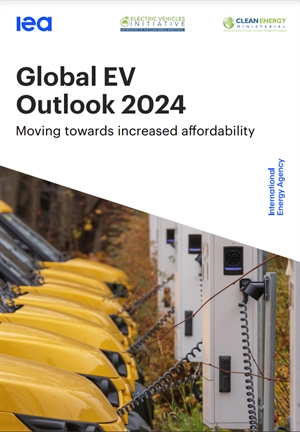IEA report presents positive picture for global EV sales
Tue 23 April 2024
View all news

A new report from the International Energy Agency (IEA) presents a bullish forecast for global electric vehicle sales, saying more than 20% of cars sold worldwide this year are expected to be electric, with demand surging for EVs over the next decade, which will substantially cut oil consumption by road transport.
The IEA's latest Global EV Outlook forecasts that growth in global electric car sales is set to remain robust in 2024. Despite near-term challenges in some markets, sales could reach around 17 million vehicles this year, powered by strong growth in China.
In the first quarter of 2024, the IEA's Outlook says, sales grew by about 25% compared with the same period in 2023 – similar to the growth rate seen in the same period a year earlier, but from a larger base. The number of electric cars sold globally in the first three months of this year is roughly equivalent to the number sold in all of 2020.
The IEA says that substantial investment in the electric vehicle supply chain, ongoing policy support, and falls in the price of EVs and their batteries are expected to produce even more significant changes in the years to come. Under today’s policy settings, the Agency says, 50% of cars sold globally are set to be electric by 2035.
Furthermore, if the energy and climate pledges that have been made by countries around the world are met in full and on time, two in three cars sold would be electric by 2035. Under this scenario, the rapid uptake of electric vehicles – from cars to vans, trucks, buses, and two- and three-wheelers – would reduce demand for around 12 million barrels of oil per day.
Alongside the Global EV Outlook, the IEA publishes related online tools: the Global EV Data Explorer and the Global EV Policy Explorer, which allow users to interactively explore detailed EV statistics, projections and policy measures worldwide.
CNN reports that more than 60% of EVs sold in China last year were less expensive than conventional cars, but in Europe and the United States the purchase price for new cars with internal combustion engines remains lower on average.
According to the IEA, intensifying market competition and improving battery technologies are expected to reduce (EV) prices in the coming years.
The IEA's Executive Director, Fatih Birol, said that recent negative headlines about slowing EV penetration are out of step with positive global trends. The data “does not at all show a reverse of the growth of electric cars. It shows an extremely robust increase of global electric car sales,” he told reporters.
There have been concerns in the UK as well as in the US and parts of Europe that misinformation about EVs - or deliberate campaigns of disinformation - are undermining demand for EVs.
The Parliamentary Office for Science and Technology has recently published a research briefing explaining how and why disinformation is spread. The briefing evaluates real-world impact and outlines counter-initiatives and policy considerations.
Related Links
< Back to news list